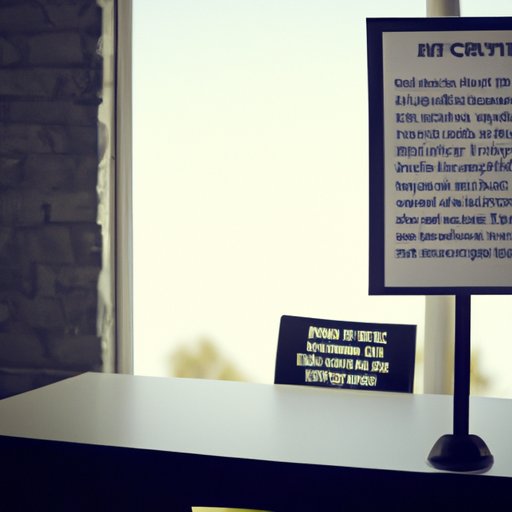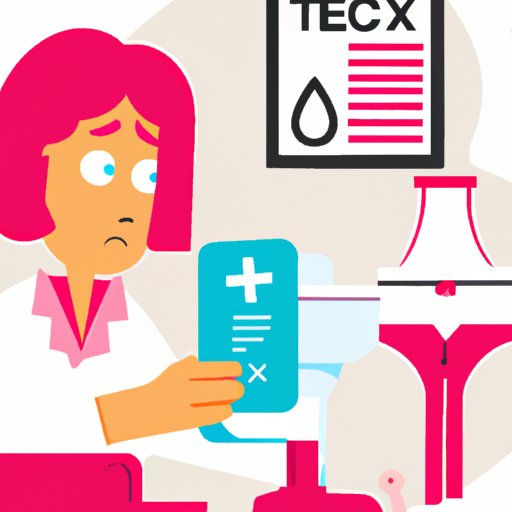Introduction
A well woman exam is an important part of preventive care for women. It is a comprehensive checkup that helps detect any potential problems or diseases, as well as provide guidance on how to maintain good health. During a well woman exam, a healthcare provider will typically perform a physical examination, a Pap smear, a pelvic exam, a breast exam, and other tests such as blood work.

Breaking Down the Different Components of a Well Woman Exam
The purpose of a well woman exam is to provide information about a woman’s overall health and wellbeing. During the exam, the healthcare provider will discuss any health concerns with the patient and may recommend lifestyle changes or screenings for certain conditions. The following are some of the components of a well woman exam:
Physical Examination
The physical examination is an important part of the well woman exam. During this portion of the exam, the healthcare provider will measure the patient’s height and weight, take their blood pressure, and listen to their heart and lungs. The provider may also ask questions about the patient’s medical history and lifestyle habits.
Pap Smear
A Pap smear is a screening test used to detect abnormal cells in the cervix. It is recommended for all women between the ages of 21 and 65 who have had sexual intercourse. During the test, the healthcare provider will use a device called a speculum to open the vagina and collect a sample of cells from the cervix. The sample is then sent to a lab for testing.
Pelvic Exam
The pelvic exam is another important part of the well woman exam. During this portion of the exam, the healthcare provider will examine the external genitalia as well as the vagina, uterus, ovaries, and fallopian tubes. The provider may also perform a bimanual exam, which involves placing two fingers inside the vagina while pressing down on the abdomen with the other hand to feel for any abnormalities.
Breast Exam
A breast exam is a screening test used to detect any lumps or changes in the breasts. During this portion of the exam, the healthcare provider will examine both breasts and the surrounding area for any signs of abnormality. The provider may also recommend a mammogram to further evaluate any suspicious findings.
Blood Work and Other Tests
The healthcare provider may also order blood work and other tests during the well woman exam. These tests can help detect any underlying health issues, such as high cholesterol or diabetes. The provider may also recommend a urine test to check for any infections.
Discussing the Benefits of a Well Woman Exam
A well woman exam can be beneficial in a variety of ways. According to a study published in the journal Women’s Health Issues, well woman exams can “improve the early detection of disease and reduce mortality due to preventable causes.” Here are some of the benefits of a well woman exam:
Early Detection of Health Problems
One of the greatest benefits of a well woman exam is that it can help detect any potential health problems before they become more serious. For example, a Pap smear can detect precancerous changes in the cervix before they turn into cancer. By detecting these health issues early, the patient can get the treatment they need before the condition becomes worse.
Prevention of Diseases
Another benefit of a well woman exam is that it can help prevent certain diseases. For example, getting regular Pap smears can reduce the risk of cervical cancer. Additionally, getting regular breast exams can help detect any changes in the breasts that could indicate breast cancer.
Improved Overall Health
Having a well woman exam can also help improve a woman’s overall health. During the exam, the healthcare provider can provide advice on how to maintain good health, such as eating a balanced diet, exercising regularly, and avoiding smoking and excessive alcohol consumption.
Outlining When Women Should Have a Well Woman Exam
It is recommended that all women have a well woman exam at least once a year. However, there are some age guidelines that should be followed when scheduling a well woman exam. According to the Centers for Disease Control and Prevention (CDC), women aged 21-29 should have a well woman exam every three years, while women aged 30-65 should have one every year.

Highlighting the Risks of Not Having a Well Woman Exam
It is important for women to keep up with their well woman exams, as not having one can lead to health issues. One of the main risks of not having a well woman exam is missing opportunities for early detection of health issues. For example, a Pap smear can detect precancerous changes in the cervix, but if the patient does not get one, the cancer can go undetected until it has progressed to a more advanced stage.
In addition to missed opportunities for early detection, not having a well woman exam can also increase the risk of developing certain diseases. For example, not getting regular Pap smears can increase the risk of cervical cancer, while not getting regular breast exams can increase the risk of breast cancer.
Sharing Tips on How to Prepare for a Well Woman Exam
Having a well woman exam can be a bit intimidating, but there are some steps you can take to make the experience easier. Here are some tips for preparing for a well woman exam:
Choosing a Doctor
When choosing a healthcare provider for your well woman exam, it is important to find someone you trust and feel comfortable talking to. You should also make sure that the provider is knowledgeable and experienced in women’s health.
Gathering Medical History
Before your appointment, it is a good idea to gather information about your medical history. This includes any past illnesses or injuries, any medications you are currently taking, and any allergies you may have. This information can help the healthcare provider provide better care.
Gather Any Current Medications
If you are currently taking any medications, it is a good idea to bring them to your appointment. This will allow the healthcare provider to review them and make sure they are appropriate for you.

Exploring Common Questions and Concerns About Well Woman Exams
Many women have questions and concerns about well woman exams. Here are some of the most common questions and concerns:
What Happens During the Exam?
During a well woman exam, the healthcare provider will typically perform a physical examination, a Pap smear, a pelvic exam, and a breast exam. The provider may also order blood work and other tests to screen for any underlying health issues.
Costs Associated with the Exam
The cost of a well woman exam can vary depending on the type of insurance you have. Many health insurance plans cover well woman exams, so it is best to check with your insurance provider to see what is covered.
Privacy Concerns
Many women are concerned about the privacy of their medical information. All healthcare providers are required to keep patient information confidential and secure. Additionally, many healthcare providers offer private rooms for well woman exams to ensure the patient’s comfort and privacy.
Conclusion
A well woman exam is an important part of preventive care for women. It can help detect any potential health issues, as well as provide guidance on how to maintain good health. While it can be intimidating, it is important to keep up with these exams in order to maintain good health. If you have any questions or concerns about a well woman exam, it is best to talk to your healthcare provider.
(Note: Is this article not meeting your expectations? Do you have knowledge or insights to share? Unlock new opportunities and expand your reach by joining our authors team. Click Registration to join us and share your expertise with our readers.)
